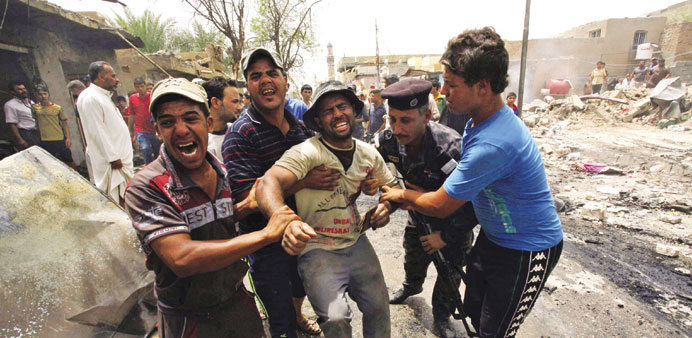Men react at the site of a car bomb attack at a market in the town of Iskandiriyah yesterday.
Attacks across Iraq, including in the normally peaceful south, killed nine people yesterday after unrest a day earlier left 40 dead, the latest in a protracted surge in nationwide bloodshed.
The violence comes as political leaders jostle to build alliances amid what is expected to be a months-long period of government formation following April elections, with bloodletting at its worst since Iraq emerged from a brutal Sunni-Shia sectarian war.
A spate of bombs went off around Baghdad and in restive Sunni-majority Salaheddin province yesterday, as well as in Najaf and Dhi Qar in the typically quiet Shia-dominated south, officials said.
In the deadliest attack, three soldiers were killed by a suicide attacker who detonated an explosives-rigged vehicle in Tarmiyah, just north of the capital.
South of Baghdad, a roadside bomb near a secondary school in Mahmudiyah killed a male pupil, and a car bomb near a Shia mosque in Iskandiriyah killed two people.
Mahmudiyah and Iskandiriyah lie in the confessionally-mixed “Triangle of Death”, so called for the brutal violence that plagued the area in 2006 and 2007.
Three separate bomb blasts in Salaheddin province left two soldiers dead and three people wounded, and rare bombings in Najaf and Dhi Qar provinces, in Shia-majority south Iraq, left one person dead and 36 wounded overall, security and medical officials said.
The latest violence came a day after 40 people were killed in nationwide unrest, including 22 who died as a result of clashes and shelling in and around the conflict-hit city of Fallujah, which lies just a short drive from Baghdad.
Security forces have shelled Fallujah for months and repeatedly tried to storm the city in a bid to retake it, but anti-government fighters have held sway over it.
Human Rights Watch said last month that Iraqi authorities have likely violated the laws of war by targeting Fallujah hospital.
The crisis in the desert province of Anbar, which borders Syria and of which Fallujah is a part, began in late December when security forces dismantled a long-standing protest camp maintained by the province’s mainly Sunni Arab population to vent grievances against the government.
Militants subsequently seized parts of the provincial capital Ramadi and all of Fallujah, the first time anti-government forces have exercised such open control in major cities since the peak of the deadly violence that followed the US-led invasion of 2003.
They have held all of Fallujah since, and protracted battles have continued for Ramadi.
The unrest in Fallujah is part of a year-long surge in nationwide violence that has left more than 4,000 people dead so far this year.
Figures separately compiled by the United Nations and the government in Baghdad showed more than 900 people were killed last month alone, with bloodletting at its worst since 2008, when Iraq was emerging from a brutal Sunni-Shia sectarian war.
Officials blame external factors for the rise in bloodshed, particularly the civil war in neighbouring Syria, and insist wide-ranging operations against militants, especially in Anbar, are having an impact.
But the violence has continued unabated, while analysts and diplomats insist the Shia-led government must do more to reach out to the disaffected Sunni minority in order to undermine support for militancy.
Boat tragedy kills 15
Fifteen people died when a boat sank during an outing on the Euphrates river in southern Iraq, local media reported yesterday.
The ferry was carrying a group of mainly women and children on a Sunday evening pleasure trip from the city of Nasiriyah, Al Sumaria television reported quoting police officials.
Six people were rescued and one remained missing by midday Monday, the officials said.

